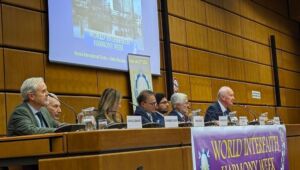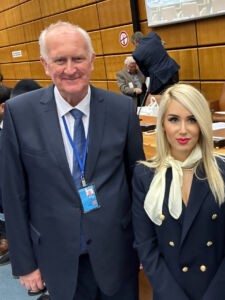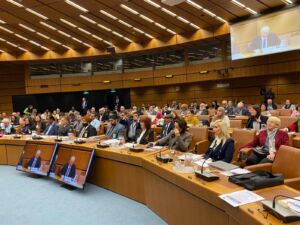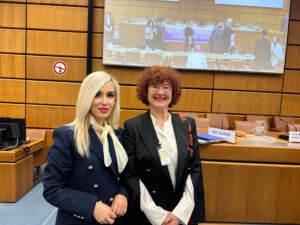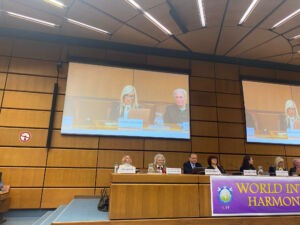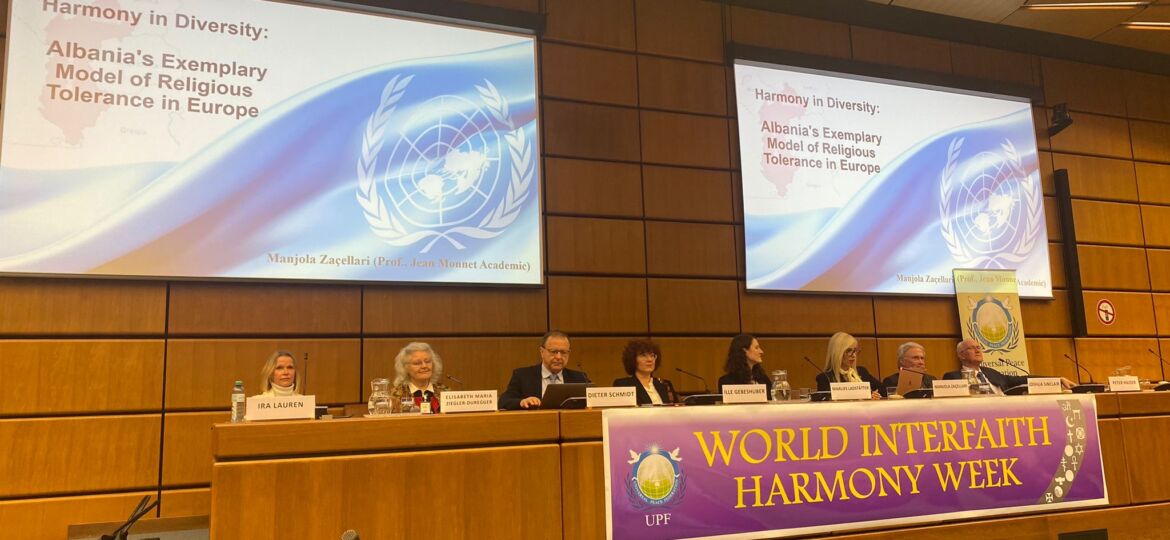
The Universal Peace Federation (UPF) and its Ambassadors for Peace network annually commemorate World Interfaith Harmony Week, promoting mutual understanding, respect, and collaboration among adherents of various faiths, aiming to enhance community welfare and foster global peace.
Supported by UNODC, the UPF, UNCAV, the Coalition of Faith-Based Organizations, Youth and Students for Peace, and the Women’s Federation for World Peace, an event commemorating the World Interfaith Harmony Week was organized on February 2nd, 2024, in the VIC (UN building) in Vienna. The conference, themed “Building a Peace Narrative at a Time of Global Crisis: The Contribution of Religion,” brought together notable figures with deep insights into religion from around the world.
The conference began with remarks from Dr. Peter Haider, President of the Austrian Federation for World Peace, who emphasized the profound significance of the World Interfaith Harmony Week. Proposed by His Majesty King Abdullah II in 2010, this annual initiative, which takes place in the first week of February, aims to promote understanding, respect, and cooperation among people of all religions. Delayed by two years due to the global pandemic, the conference gained importance in 2024.
Dr. Afsar Rathor, former UN diplomat and President of LIOS-SOIL, underscored the pivotal role that religion can play in achieving peace and advancing the United Nations’ Sustainable Development Goals (SDGs). Dr. Rathor shared compelling examples of how religious values such as compassion, generosity, and environmental stewardship can significantly contribute to addressing critical global challenges such as poverty, inequality, and climate change.
Jean Luc Lemahieu, representative of the United Nations Office on Drugs and Crime, emphasized the fundamental role of religion in fostering a positive narrative of peace and tolerance. He underscored the urgent need to counter extremist and hateful discourses by amplifying voices of moderation within religious communities. Additionally, Lemahieu highlighted the potential of religious engagement in addressing the root causes of conflicts, including social, economic, and political grievances.
Ms. Rana Abida delivered a passionate speech, emphasizing the timeliness of the conference theme in the face of multiple global crises. She eloquently underscored the vital role of interfaith harmony in peacebuilding and addressing pressing global issues such as hunger, poverty, and justice. Ms. Abida called for coordinated global collaboration to resist divisive forces and collectively build a more peaceful world.
Professor Dr. Johannes Huber shared profound insights, focusing on three key considerations from a Christian perspective: forgiveness, self-examination, and the interconnectedness of the universe. He delved into the concept of forgiveness within Christianity, emphasizing the necessity of daily reflection to avoid misery. Dr. Huber also delved into the quantum mechanical aspects of life and suggested a potential connection between quantum biological and spiritual aspects.
Continuing the exploration of various perspectives, Professor Dr. Hussain-Mohi-Ud-Din Qadari, Vice President of Minhaj University in Lahore, provided a nuanced examination of interreligious relations from an Islamic standpoint. Dr. Qadari emphasized four crucial dimensions and urged appreciation for the diverse perspectives, considering the religious or secular nature of the involved communities, understanding historical interactions, and scrutinizing religious texts to engage with other communities.
For Professor Dr. Elmar Kuhn, President of the Coalition of Faith-Based Organizations Central-Europe, a profound understanding of our history forms a crucial foundation for building a peaceful future. Without this comprehension of our present circumstances, achieving a harmonious future becomes a challenging task.
The distinguished speaker, Professor Dr. Ille Gebeshuber, Professor at the Institute of Applied Physics at the Technical University of Vienna and also President of the Catholic Academics Association of Austria, delved into the multifaceted challenges facing humanity in the 21st century. From population growth to climate change to conflicts, she characterized these issues as interconnected crises. Prof. Gebeshuber shed light on the diminishing value of democracy in the face of modern technological capabilities that contribute to social inequalities.
Following that, Prof. Manjola Zaçellari, Professor of Linguistics (Multilingualism and Intercultural Dialogue) at Aleksander Moisiu University in Durres (Albania), offered insights into the unique case of interreligious harmony in Albania, a country known for its exemplary model of religious tolerance and coexistence.
Prof. Zaçellari emphasized Albania’s historical and geographical context, which serves as an interface of various cultures and religions. While highlighting the diversity of religious traditions and the coexistence of Muslims, Christians, and other communities, she underscored the traditional practice of mutual respect and cooperation. She highlighted the role of the family as a significant factor in promoting interreligious harmony by presenting examples from the Albanian context.
Prof. Zaçellari also described educational initiatives in Albania aimed at promoting understanding and respect between religions. She stressed the need for continuous investment in education as a key to maintaining interreligious harmony in society. Her contribution highlighted the importance of concrete actions at both individual and institutional levels to strengthen the principles of tolerance and dialogue.
Dr. Joshua Sinclair, an American writer, filmmaker, actor, director, and physician, delivered a thoughtful speech during the Interfaith Harmony Week event in Vienna. Dr. Sinclair delved into the hypothetical notion of the complete eradication of suffering, pondering its potential impacts on art, literature, music, and religious texts. He emphasized that the essence of peace lies in understanding and embracing suffering. Drawing references from renowned poets and writers such as T.S. Eliot and Oscar Wilde, Dr. Sinclair explored the profound effect of suffering on human creativity and spiritual growth.


